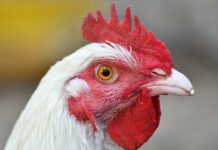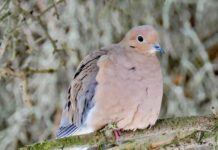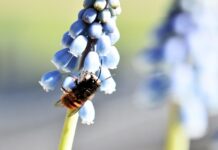Is it true that birds in my backyard will starve if I don’t feed them?
And my neighbor insists that if I start feeding them, I must continue all winter long. Is this true? These are questions I hear many times every year. The simple answers are “no” and “no.”
Though birds happily accept our handouts, they do just fine without supplemental foods, with one exception, which I will get to later.
Birds are mobile and can easily find food sources over a large area. Feeders just make their lives easier. They can spend more time actually eating instead of searching for food.
Chickadee
In research from the late 1980s and early 1990s biologists studied banded populations of black-capped chickadees in Wisconsin to determine if chickadees became dependent on feeders. They did not.
There were no differences in winter survival between birds with access to feeders and those without access to feeders.
And even though it may seem that birds are at feeders all day long and thus appear to become dependent, observations of banded birds indicate that they are not the same individuals.
Birds roam throughout the day to visit many food sources. And even when birds had access to feeders, they got only 21 percent of their food from them.
It should be intuitively obvious that life is easier for birds with access to extra food, but it’s clearly not a matter of life and death. Birds are simply smart enough to take advantage of seemingly infinite supplies of easy to find foods.
Costly
Getting back to the point of this column, birds don’t need our help to survive. There is almost always plenty of natural foods to supply their needs.
So why do we go to the expense and bother of feeding backyard birds?
Over the last 30 years, I would conservatively estimate that I have spent at least $400 annually on birdseed and feeders. That comes to about $12,000.
And what do I have to show for it? Absolutely nothing, except the feeders that I bought along the way.
But that’s OK. In my mind, there’s only one reason to feed wild birds — to enjoy them.
Enjoying birds
I love the way the birds greet me when I approach feeders with a scoop of seed. Chickadees, titmice, and nuthatches come within an arm’s length to hurry me along.
Sometimes I sit beneath the feeders, and birds come to my outstretched hand to grab a sunflower kernel or two. It’s pure magic.
Few things give me more satisfaction. I feed birds because food attracts them to places where I can see them and because I enjoy it.
Birds entertain me and make me smile. And sometimes I feel they think favorably of me in return.
Chickadees, titmice, and nuthatches, in particular, come close when I “pish” to announce that I have filled the feeders. I never tire of close encounters with wild, free-flying birds.
Bottom line is we feed birds for our enjoyment. We welcome their company, their entertaining behavior, and their bright colors.
That’s why Americans spend more than three billion (yes, billion with a “B”) dollars each year on bird food and feeders. We feed birds so we can watch them.
Harsh conditions
As I teased earlier, there are conditions under which providing food can help birds survive extreme conditions. Heavy snow and ice storms can devastate winter birds because food is literally locked away.
Well-stocked feeders solve that problem. Fortunately, blizzards and ice storms are infrequent events. And some years we escape them completely.
And though it may seem counter-intuitive, wild birds do not become dependent on feeders because they are highly mobile and naturally depend on patchy food supplies.
Their survival depends on an innate ability to find unpredictably distributed patches of food. When one patch is exhausted, they move on to another.
Birds are mobile
In the course of birds’ daily lives, they visit many different food patches and thus are continually monitoring changing food supplies.
Feeders are simply reliable food patches. If you go away for a few days, birds will find natural foods or neighbors’ feeders. When you return and refill the feeders, birds usually return within 24 hours.













